Emotional and Medical Risks of Commercial Surrogacy
VerifiedAdded on 2023/06/14
|6
|1392
|110
AI Summary
This article discusses the emotional and medical risks associated with commercial surrogacy. It highlights the importance of conducting thorough research and consulting with doctors, fertility clinics, family, and intended parents. The risks include medical complications such as hypertension, gestational diabetes, and preterm labor, as well as emotional effects such as depression and grief. The article emphasizes the need for surrogates to closely associate with experienced surrogacy professionals to minimize the risks.
Contribute Materials
Your contribution can guide someone’s learning journey. Share your
documents today.

Running head: ETHICS 1
Ethics
Student’s Name
Institutional Affiliation
Ethics
Student’s Name
Institutional Affiliation
Secure Best Marks with AI Grader
Need help grading? Try our AI Grader for instant feedback on your assignments.
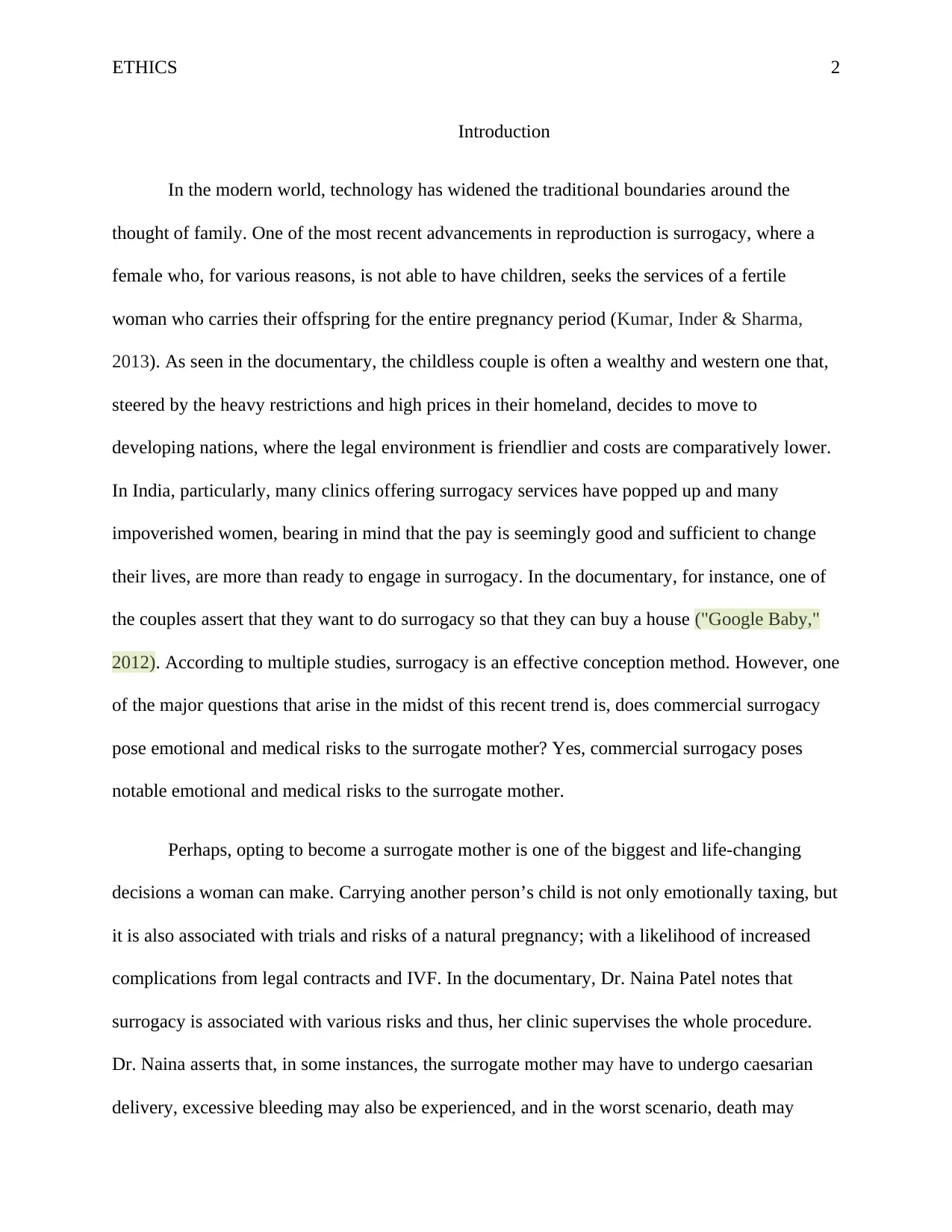
ETHICS 2
Introduction
In the modern world, technology has widened the traditional boundaries around the
thought of family. One of the most recent advancements in reproduction is surrogacy, where a
female who, for various reasons, is not able to have children, seeks the services of a fertile
woman who carries their offspring for the entire pregnancy period (Kumar, Inder & Sharma,
2013). As seen in the documentary, the childless couple is often a wealthy and western one that,
steered by the heavy restrictions and high prices in their homeland, decides to move to
developing nations, where the legal environment is friendlier and costs are comparatively lower.
In India, particularly, many clinics offering surrogacy services have popped up and many
impoverished women, bearing in mind that the pay is seemingly good and sufficient to change
their lives, are more than ready to engage in surrogacy. In the documentary, for instance, one of
the couples assert that they want to do surrogacy so that they can buy a house ("Google Baby,"
2012). According to multiple studies, surrogacy is an effective conception method. However, one
of the major questions that arise in the midst of this recent trend is, does commercial surrogacy
pose emotional and medical risks to the surrogate mother? Yes, commercial surrogacy poses
notable emotional and medical risks to the surrogate mother.
Perhaps, opting to become a surrogate mother is one of the biggest and life-changing
decisions a woman can make. Carrying another person’s child is not only emotionally taxing, but
it is also associated with trials and risks of a natural pregnancy; with a likelihood of increased
complications from legal contracts and IVF. In the documentary, Dr. Naina Patel notes that
surrogacy is associated with various risks and thus, her clinic supervises the whole procedure.
Dr. Naina asserts that, in some instances, the surrogate mother may have to undergo caesarian
delivery, excessive bleeding may also be experienced, and in the worst scenario, death may
Introduction
In the modern world, technology has widened the traditional boundaries around the
thought of family. One of the most recent advancements in reproduction is surrogacy, where a
female who, for various reasons, is not able to have children, seeks the services of a fertile
woman who carries their offspring for the entire pregnancy period (Kumar, Inder & Sharma,
2013). As seen in the documentary, the childless couple is often a wealthy and western one that,
steered by the heavy restrictions and high prices in their homeland, decides to move to
developing nations, where the legal environment is friendlier and costs are comparatively lower.
In India, particularly, many clinics offering surrogacy services have popped up and many
impoverished women, bearing in mind that the pay is seemingly good and sufficient to change
their lives, are more than ready to engage in surrogacy. In the documentary, for instance, one of
the couples assert that they want to do surrogacy so that they can buy a house ("Google Baby,"
2012). According to multiple studies, surrogacy is an effective conception method. However, one
of the major questions that arise in the midst of this recent trend is, does commercial surrogacy
pose emotional and medical risks to the surrogate mother? Yes, commercial surrogacy poses
notable emotional and medical risks to the surrogate mother.
Perhaps, opting to become a surrogate mother is one of the biggest and life-changing
decisions a woman can make. Carrying another person’s child is not only emotionally taxing, but
it is also associated with trials and risks of a natural pregnancy; with a likelihood of increased
complications from legal contracts and IVF. In the documentary, Dr. Naina Patel notes that
surrogacy is associated with various risks and thus, her clinic supervises the whole procedure.
Dr. Naina asserts that, in some instances, the surrogate mother may have to undergo caesarian
delivery, excessive bleeding may also be experienced, and in the worst scenario, death may
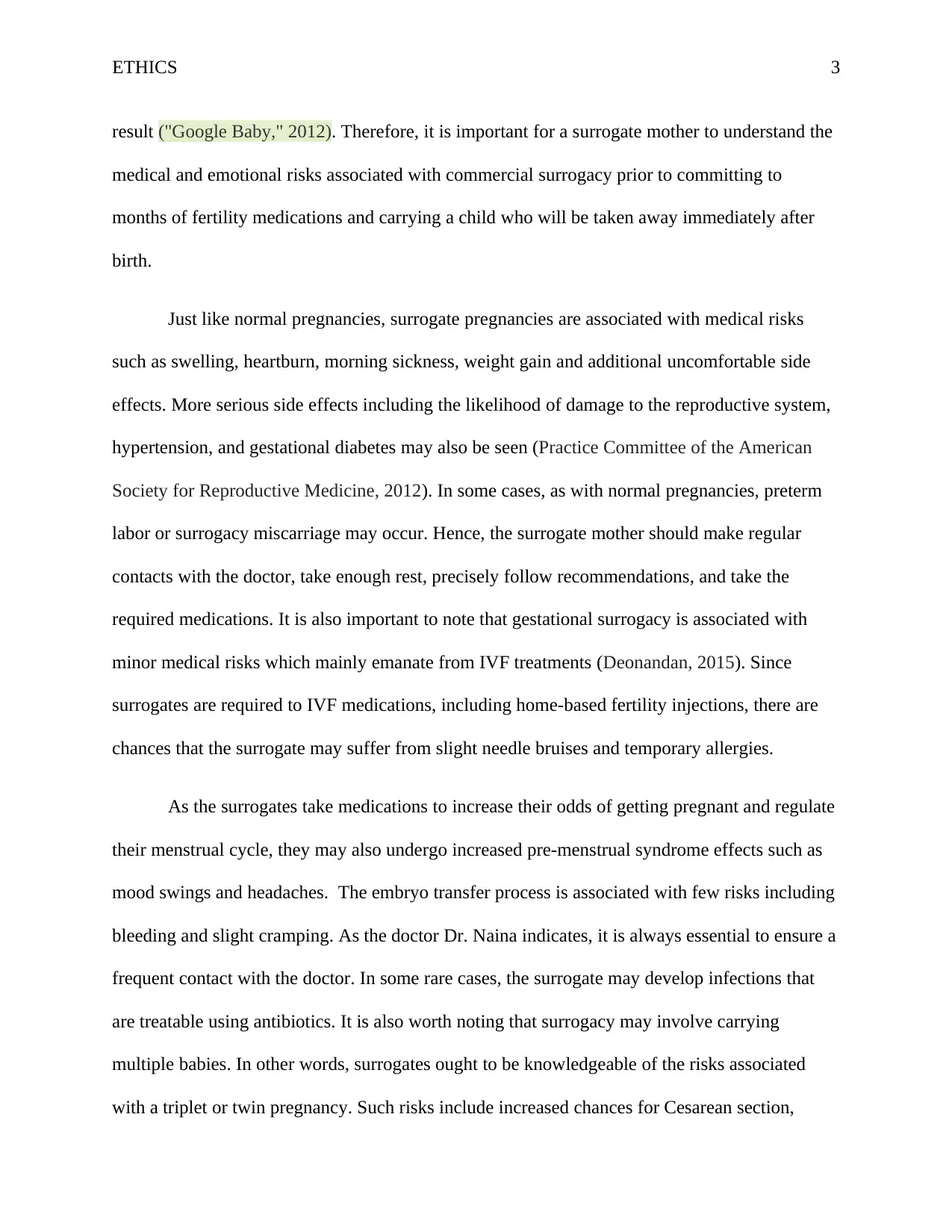
ETHICS 3
result ("Google Baby," 2012). Therefore, it is important for a surrogate mother to understand the
medical and emotional risks associated with commercial surrogacy prior to committing to
months of fertility medications and carrying a child who will be taken away immediately after
birth.
Just like normal pregnancies, surrogate pregnancies are associated with medical risks
such as swelling, heartburn, morning sickness, weight gain and additional uncomfortable side
effects. More serious side effects including the likelihood of damage to the reproductive system,
hypertension, and gestational diabetes may also be seen (Practice Committee of the American
Society for Reproductive Medicine, 2012). In some cases, as with normal pregnancies, preterm
labor or surrogacy miscarriage may occur. Hence, the surrogate mother should make regular
contacts with the doctor, take enough rest, precisely follow recommendations, and take the
required medications. It is also important to note that gestational surrogacy is associated with
minor medical risks which mainly emanate from IVF treatments (Deonandan, 2015). Since
surrogates are required to IVF medications, including home-based fertility injections, there are
chances that the surrogate may suffer from slight needle bruises and temporary allergies.
As the surrogates take medications to increase their odds of getting pregnant and regulate
their menstrual cycle, they may also undergo increased pre-menstrual syndrome effects such as
mood swings and headaches. The embryo transfer process is associated with few risks including
bleeding and slight cramping. As the doctor Dr. Naina indicates, it is always essential to ensure a
frequent contact with the doctor. In some rare cases, the surrogate may develop infections that
are treatable using antibiotics. It is also worth noting that surrogacy may involve carrying
multiple babies. In other words, surrogates ought to be knowledgeable of the risks associated
with a triplet or twin pregnancy. Such risks include increased chances for Cesarean section,
result ("Google Baby," 2012). Therefore, it is important for a surrogate mother to understand the
medical and emotional risks associated with commercial surrogacy prior to committing to
months of fertility medications and carrying a child who will be taken away immediately after
birth.
Just like normal pregnancies, surrogate pregnancies are associated with medical risks
such as swelling, heartburn, morning sickness, weight gain and additional uncomfortable side
effects. More serious side effects including the likelihood of damage to the reproductive system,
hypertension, and gestational diabetes may also be seen (Practice Committee of the American
Society for Reproductive Medicine, 2012). In some cases, as with normal pregnancies, preterm
labor or surrogacy miscarriage may occur. Hence, the surrogate mother should make regular
contacts with the doctor, take enough rest, precisely follow recommendations, and take the
required medications. It is also important to note that gestational surrogacy is associated with
minor medical risks which mainly emanate from IVF treatments (Deonandan, 2015). Since
surrogates are required to IVF medications, including home-based fertility injections, there are
chances that the surrogate may suffer from slight needle bruises and temporary allergies.
As the surrogates take medications to increase their odds of getting pregnant and regulate
their menstrual cycle, they may also undergo increased pre-menstrual syndrome effects such as
mood swings and headaches. The embryo transfer process is associated with few risks including
bleeding and slight cramping. As the doctor Dr. Naina indicates, it is always essential to ensure a
frequent contact with the doctor. In some rare cases, the surrogate may develop infections that
are treatable using antibiotics. It is also worth noting that surrogacy may involve carrying
multiple babies. In other words, surrogates ought to be knowledgeable of the risks associated
with a triplet or twin pregnancy. Such risks include increased chances for Cesarean section,
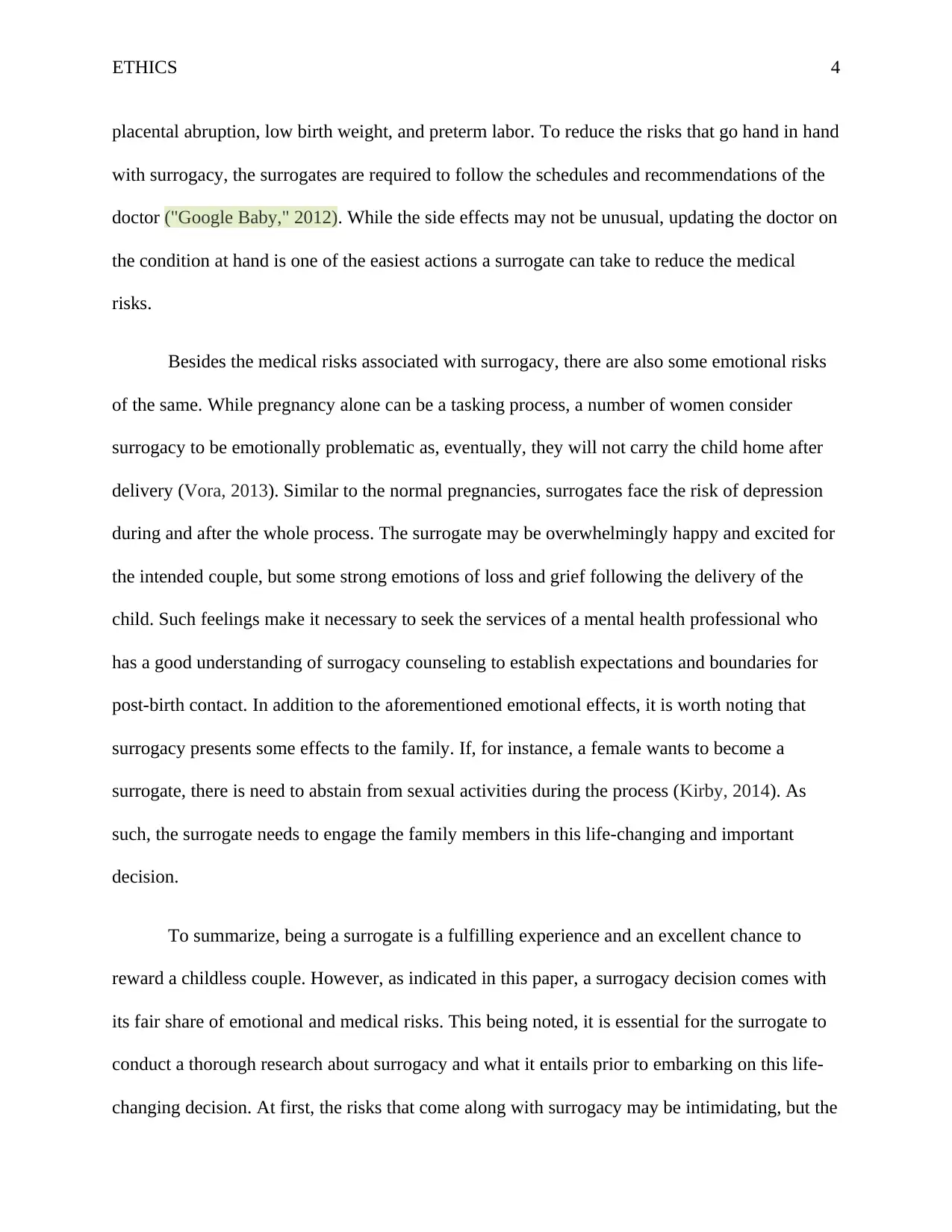
ETHICS 4
placental abruption, low birth weight, and preterm labor. To reduce the risks that go hand in hand
with surrogacy, the surrogates are required to follow the schedules and recommendations of the
doctor ("Google Baby," 2012). While the side effects may not be unusual, updating the doctor on
the condition at hand is one of the easiest actions a surrogate can take to reduce the medical
risks.
Besides the medical risks associated with surrogacy, there are also some emotional risks
of the same. While pregnancy alone can be a tasking process, a number of women consider
surrogacy to be emotionally problematic as, eventually, they will not carry the child home after
delivery (Vora, 2013). Similar to the normal pregnancies, surrogates face the risk of depression
during and after the whole process. The surrogate may be overwhelmingly happy and excited for
the intended couple, but some strong emotions of loss and grief following the delivery of the
child. Such feelings make it necessary to seek the services of a mental health professional who
has a good understanding of surrogacy counseling to establish expectations and boundaries for
post-birth contact. In addition to the aforementioned emotional effects, it is worth noting that
surrogacy presents some effects to the family. If, for instance, a female wants to become a
surrogate, there is need to abstain from sexual activities during the process (Kirby, 2014). As
such, the surrogate needs to engage the family members in this life-changing and important
decision.
To summarize, being a surrogate is a fulfilling experience and an excellent chance to
reward a childless couple. However, as indicated in this paper, a surrogacy decision comes with
its fair share of emotional and medical risks. This being noted, it is essential for the surrogate to
conduct a thorough research about surrogacy and what it entails prior to embarking on this life-
changing decision. At first, the risks that come along with surrogacy may be intimidating, but the
placental abruption, low birth weight, and preterm labor. To reduce the risks that go hand in hand
with surrogacy, the surrogates are required to follow the schedules and recommendations of the
doctor ("Google Baby," 2012). While the side effects may not be unusual, updating the doctor on
the condition at hand is one of the easiest actions a surrogate can take to reduce the medical
risks.
Besides the medical risks associated with surrogacy, there are also some emotional risks
of the same. While pregnancy alone can be a tasking process, a number of women consider
surrogacy to be emotionally problematic as, eventually, they will not carry the child home after
delivery (Vora, 2013). Similar to the normal pregnancies, surrogates face the risk of depression
during and after the whole process. The surrogate may be overwhelmingly happy and excited for
the intended couple, but some strong emotions of loss and grief following the delivery of the
child. Such feelings make it necessary to seek the services of a mental health professional who
has a good understanding of surrogacy counseling to establish expectations and boundaries for
post-birth contact. In addition to the aforementioned emotional effects, it is worth noting that
surrogacy presents some effects to the family. If, for instance, a female wants to become a
surrogate, there is need to abstain from sexual activities during the process (Kirby, 2014). As
such, the surrogate needs to engage the family members in this life-changing and important
decision.
To summarize, being a surrogate is a fulfilling experience and an excellent chance to
reward a childless couple. However, as indicated in this paper, a surrogacy decision comes with
its fair share of emotional and medical risks. This being noted, it is essential for the surrogate to
conduct a thorough research about surrogacy and what it entails prior to embarking on this life-
changing decision. At first, the risks that come along with surrogacy may be intimidating, but the
Secure Best Marks with AI Grader
Need help grading? Try our AI Grader for instant feedback on your assignments.
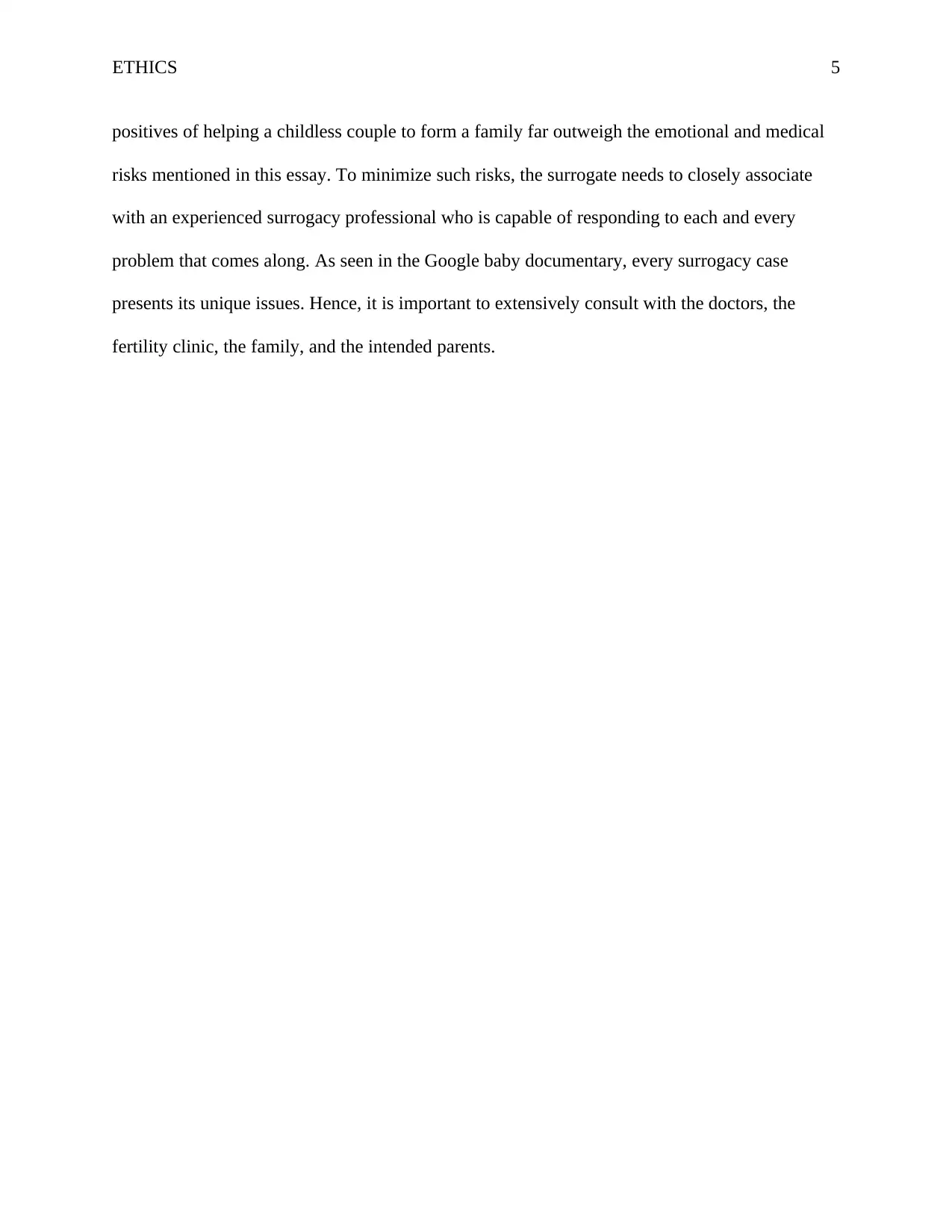
ETHICS 5
positives of helping a childless couple to form a family far outweigh the emotional and medical
risks mentioned in this essay. To minimize such risks, the surrogate needs to closely associate
with an experienced surrogacy professional who is capable of responding to each and every
problem that comes along. As seen in the Google baby documentary, every surrogacy case
presents its unique issues. Hence, it is important to extensively consult with the doctors, the
fertility clinic, the family, and the intended parents.
positives of helping a childless couple to form a family far outweigh the emotional and medical
risks mentioned in this essay. To minimize such risks, the surrogate needs to closely associate
with an experienced surrogacy professional who is capable of responding to each and every
problem that comes along. As seen in the Google baby documentary, every surrogacy case
presents its unique issues. Hence, it is important to extensively consult with the doctors, the
fertility clinic, the family, and the intended parents.
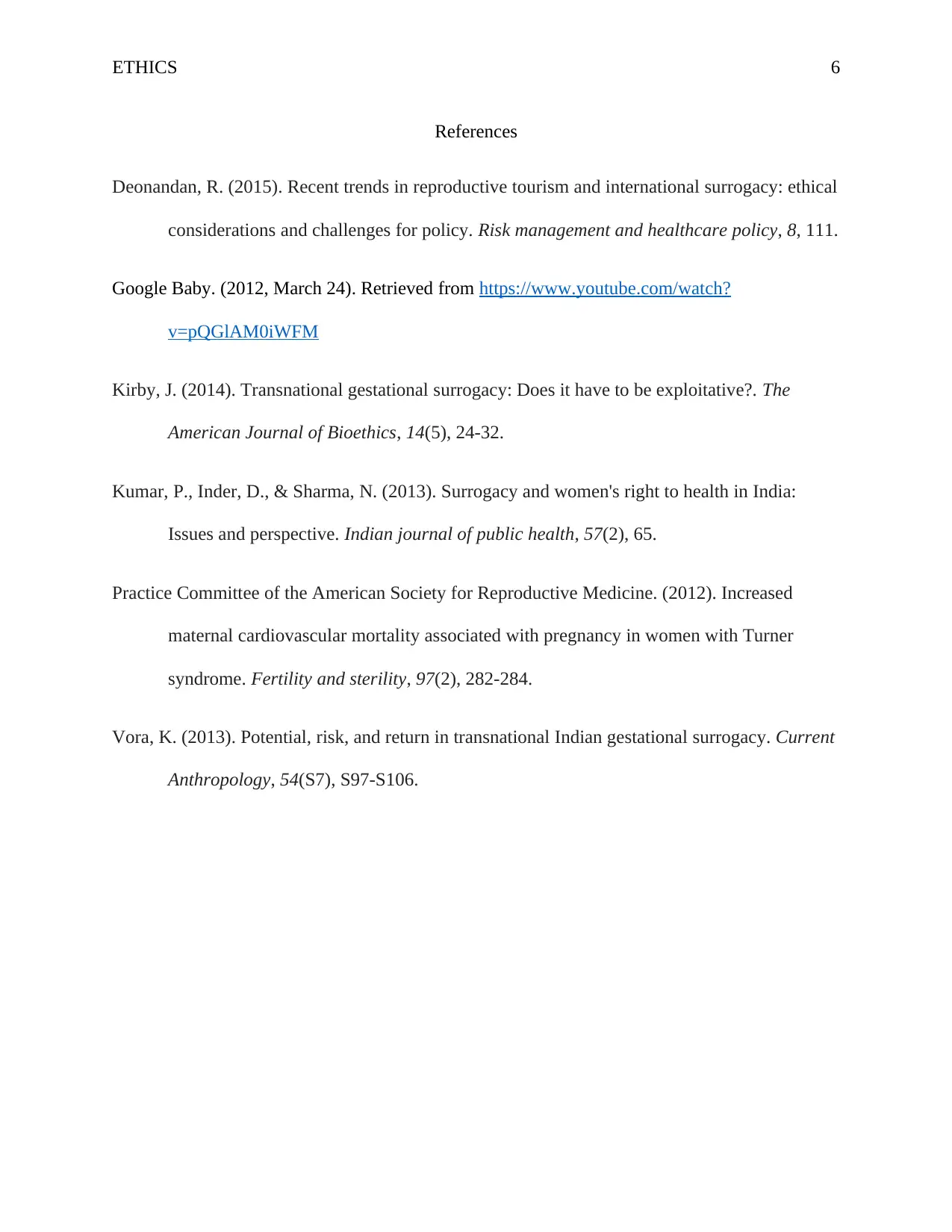
ETHICS 6
References
Deonandan, R. (2015). Recent trends in reproductive tourism and international surrogacy: ethical
considerations and challenges for policy. Risk management and healthcare policy, 8, 111.
Google Baby. (2012, March 24). Retrieved from https://www.youtube.com/watch?
v=pQGlAM0iWFM
Kirby, J. (2014). Transnational gestational surrogacy: Does it have to be exploitative?. The
American Journal of Bioethics, 14(5), 24-32.
Kumar, P., Inder, D., & Sharma, N. (2013). Surrogacy and women's right to health in India:
Issues and perspective. Indian journal of public health, 57(2), 65.
Practice Committee of the American Society for Reproductive Medicine. (2012). Increased
maternal cardiovascular mortality associated with pregnancy in women with Turner
syndrome. Fertility and sterility, 97(2), 282-284.
Vora, K. (2013). Potential, risk, and return in transnational Indian gestational surrogacy. Current
Anthropology, 54(S7), S97-S106.
References
Deonandan, R. (2015). Recent trends in reproductive tourism and international surrogacy: ethical
considerations and challenges for policy. Risk management and healthcare policy, 8, 111.
Google Baby. (2012, March 24). Retrieved from https://www.youtube.com/watch?
v=pQGlAM0iWFM
Kirby, J. (2014). Transnational gestational surrogacy: Does it have to be exploitative?. The
American Journal of Bioethics, 14(5), 24-32.
Kumar, P., Inder, D., & Sharma, N. (2013). Surrogacy and women's right to health in India:
Issues and perspective. Indian journal of public health, 57(2), 65.
Practice Committee of the American Society for Reproductive Medicine. (2012). Increased
maternal cardiovascular mortality associated with pregnancy in women with Turner
syndrome. Fertility and sterility, 97(2), 282-284.
Vora, K. (2013). Potential, risk, and return in transnational Indian gestational surrogacy. Current
Anthropology, 54(S7), S97-S106.
1 out of 6
Your All-in-One AI-Powered Toolkit for Academic Success.
+13062052269
info@desklib.com
Available 24*7 on WhatsApp / Email
![[object Object]](/_next/static/media/star-bottom.7253800d.svg)
Unlock your academic potential
© 2024 | Zucol Services PVT LTD | All rights reserved.

